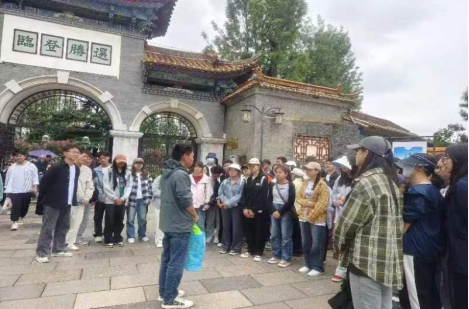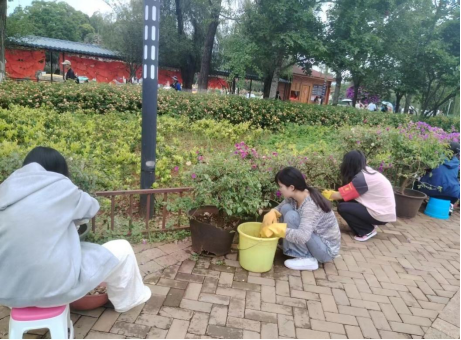《全球旅游伦理规范》为旅游行业的可持续发展提供了全面的指导框架,涵盖了旅游对社会、文化、环境和经济等多方面的影响及责任。昆明学院旅游管理专业2023级学生在大观公园开展的劳动实践活动,高度契合《全球旅游伦理规范》中的多项准则,以实际行动为旅游与环境和谐共生贡献力量,具体表现如下:
1、践行“保护自然环境与资源”原则
垃圾清理,守护公园清洁生态:在园区垃圾清理工作中,学生们细致地对公园各个角落进行排查,收集游客丢弃的各类垃圾,包括塑料瓶、食品包装袋、废纸等。通过这一行动,减少了垃圾对土壤、水体及空气的潜在污染,避免垃圾中的有害物质渗入地下,影响公园内植物生长及水体生态平衡,维护了公园生态系统的完整性,契合规范中保护自然环境、避免旅游活动对环境造成污染与破坏的要求。
绿植浇灌与杂草清除,助力生态健康:在对园区绿植浇灌时,学生们依据不同植物的需水特性,合理控制水量,既保证植物获得充足水分,又避免水资源浪费,践行了规范中节约稀有和珍贵资源的理念。在杂草清除工作中,学生们手动拔除杂草,防止杂草过度生长与园内植物争夺养分、阳光和空间,维护了公园植物群落的稳定与多样性,促进了自然景观的健康发展,符合保护自然遗产及生态系统的规范准则。
2、落实 “维护旅游资源可持续利用”原则
公共设施清洗,延长设施使用寿命:学生们认真清洗公园内的公共设施,如长椅、垃圾桶、指示牌等。通过去除设施表面的污垢、灰尘和锈迹,不仅提升了设施的美观度,更重要的是减少了设施的腐蚀和损坏程度,延长了公共设施的使用寿命。这一行为减少了资源的不必要浪费,体现了对旅游基础设施的维护与可持续利用,符合规范中旅游发展利益相关者应保护和合理利用资源的要求。
3、推动“促进旅游行业责任意识”原则
身体力行,传播责任意识:作为旅游管理专业的学生,他们在大观公园的劳动实践,不仅是对自身专业素养的锻炼,更是向社会传递了旅游从业者应有的责任意识。通过在公园内的实际行动,如有序清理垃圾、认真养护绿植等,为其他游客树立了榜样,引导广大游客爱护公园环境,增强了公众对旅游环境的保护意识,推动了旅游行业整体责任意识的提升,符合规范中倡导旅游活动各方共同承担责任、促进可持续发展的精神。
此次旅游管理专业2023级学生在大观公园的劳动实践,全方位地践行了《全球旅游伦理规范》,为旅游可持续发展贡献了积极力量,也为其他旅游相关从业者和游客树立了良好的典范,充分证明了学生群体在推动旅游伦理实践中的重要作用与价值。


Students in Tourism Management actively apply the principles of the Global Code of Ethics for Tourism in their practical endeavors
The "Global Code of Ethics for Tourism" provides a framework for sustainable tourism development, addressing its impacts and responsibilities in society, culture, environment, and economy. Students from grade 2023 of Tourism Management at School of Tourism, Kunming University, took part in a labor practice activity at Daguan Park. The activity highly aligns with core principles of the "Global Code of Ethics for Tourism" and supports sustainable tourism-environment interactions. The following summarizes the main actions taken:
Ⅰ. Following the "Environmental and Resource Protection" principle
Waste management, Park Cleanliness and Ecological Protection: Students inspected all park areas and collected common tourist waste like plastic bottles, food packaging, and paper scraps. This initiative reduced environmental pollution risks from waste, preventing harmful substances from contaminating soil and harming plant and aquatic life in park. It supports the park’s ecological integrity and meets regulations on protecting natural environments from tourism-related damage.
Watering plants and removing weeds support ecological health: During the irrigation of park vegetation, Students applied targeted irrigation based on plant needs, ensuring adequate hydration for plant growth while promoting efficient use of water resources. This action follows regulations to conserve valuable natural resources. During the weed removal process, students manually removed weeds to prevent overgrowth and competition with native plants for nutrients, sunlight, and space. This helped maintain the park’s plant biodiversity, support natural landscape health, and follow conservation regulations.
Ⅱ. Following the " sustainable tourism resource management" principle
Cleaning public facilities extends their lifespan: Students cleaned park facilities such as benches, bins, and signs. Through the removal of dirt, dust, and rust from facility surfaces, both aesthetic enhancement and functional preservation are achieved, effectively mitigating corrosion and structural damage while prolonging the service life of public infrastructure. This action reduces waste, supports sustainable tourism infrastructure management, and meets regulations requirements for responsible resource use by tourism stakeholders.
Ⅲ. Promoting the "Tourism Industry Responsibility Awareness" principle
Leading by example and promoting accountability awareness: Tourism management students at Daguan Park applied knowledge in practice, strengthened professional skills, and demonstrated the industry’s ethical responsibilities. Through actions like systematic waste removal and plant maintenance, students set a positive example for park visitors, promoting environmental stewardship. These efforts raised public awareness of tourism sustainability and strengthened industry-wide responsibility. This supports the principle that all tourism stakeholders should share responsibility and collaborate for sustainable development.
Students from grade 2023 of Tourism Management engaged in labor practice at Daguan Park, effectively implementing the "Global Code of Ethics for Tourism." This initiative made a meaningful contribution to the advancement of sustainable tourism and served as a model for other tourism professionals and visitors. It also clearly demonstrated the significant role and value of student groups in promoting ethical tourism practices.